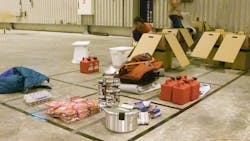Start of Wings For Aid World Tour in Curaçao
Reaching people in inaccessible areas to provide them with life-saving supplies is a significant issue. The Dutch start-up Wings For Aid developed an innovative approach to this ‘last-mile’ problem, designing self-landing delivery boxes for unmanned aircraft. Last week, it started its world tour in Curaçao with a demonstration flight. The aim of the world tour is to inform global stakeholders and to test-drive operational procedures. Later this year, the organisation plans to launch a new remotely piloted aircraft with increased payload capacity.
Starting off in the Caribbean with a demonstration flight on the Wacawa military ground in Curaçao, the tour will next lead to Africa. Wings For Aid will participate in the African Drone Forum the Feb 5-7 in Rwanda and demonstrate the delivery system there. The tour is based on the different logistic challenges each region faces to ensure the best implementation.
“We are building up our international network to become a cargo drone airline for emergency aid logistics. With our system we can provide thousands of people in need with food, water or any other life-saving supplies. Humanitarian actors can use our service, when other means of transport are not available, too expensive or too dangerous. During the world tour we want to demonstrate our work and show the logistical impact of our system”, said Barry Koperberg, founder of Wings For Aid.
After years of conceptual work and perfection of the service, the Dutch organisation will become fully operational in 2020. To gain a proper understanding of the situation in the different countries and to spread the word about the system to the relevant stakeholders, Wings For Aid will attend various forums, exhibitions and conferences worldwide targeting specifically the areas where the service would be of need.
In mid-2020 a new remotely piloted aircraft will be introduced, increasing the number of boxes carried per drone from six to eight. One aircraft can carry 160 kg of payload and drop the carton boxes with pin-point accuracy bridging distances up to 250 km. The boxes are designed to land upright and absorb the impact to sustain content integrity.
Wings For Aid has chosen Rhenus Air & Ocean as its official logistics partner. Rhenus supports Wings For Aid globally in getting the delivering system to the areas in need as quickly and efficiently as possible, including the world tour. Both parties signed a cooperation agreement in July 2019.
In short, Wings For Aid developed a strategy to make micro-distribution scalable, anywhere and at any time. An estimated 20 percent of 100 million people in need of emergency aid can’t be reached. One of the main reasons is the current impossibility to bridge ‘the last mile’. The self-landing delivery boxes, transported by remotely piloted aircraft, are made out of biodegradable cardboard and can therefore be mass-produced at affordable prices. Moreover, there is no environmental impact in the field while the box can also be used for heating or insulation after the drop. Also considering the social impact, this achievement was recently honored with the Sustainability Award of The International Air Cargo Association.
